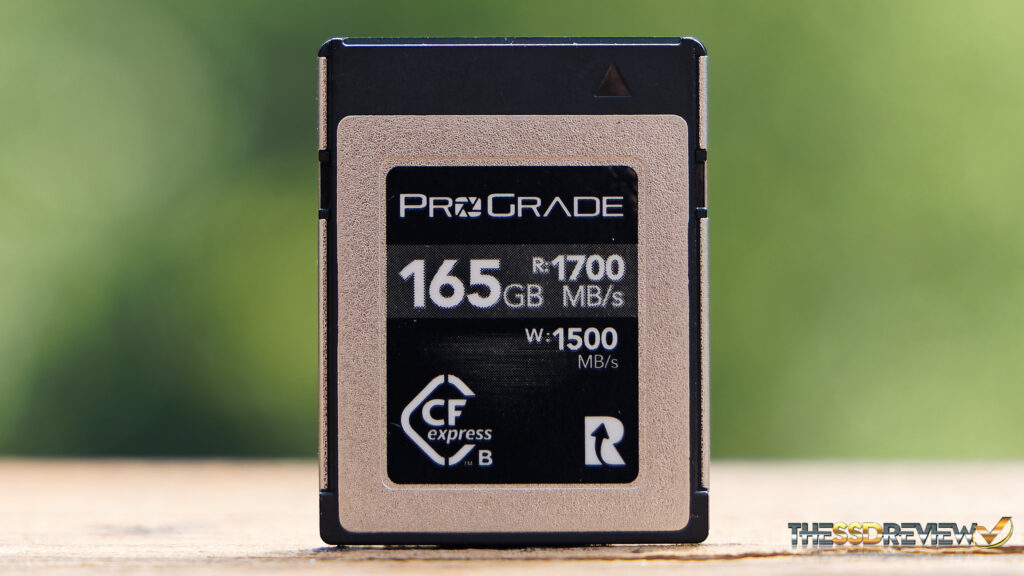I get asked quite often what I prefer with respect to storage cards in my camera equipment. I try to stay away from exact brands and move the conversation into what I believe are necessary characteristics of the cards that I will put in my digital equipment. Three things stand out. I want storage that has high sustained write speeds for those times that I push the camera. That storage must provide the best data transfer speeds and, last but not least, I want a card that maintains acceptable temps under pressure. These tests are the regimen of our CFExpress testing.
ProGrade Digital sent along a new release which follows along the line of their Cobalt 625GB and their Cobalt 325GB cards that we reviewed almost two years ago. It seems to be the little brother of the 625GB Cobalt that I have had in my EOS R5 since reviewing it. This card is intended for those that don’t need the massive storage of the 625GB; it seems to be intended for the photographer specifically…but with the very same specs and an attractive price to match.
The ProGrade Digital 165GB Cobalt CFExpress Type B card boasts impressive transfer speeds of 1700MB/s read, 1500MB/s write and 1400MB/s sustained write performance which would make it a class leader. It is based on a PCIE Gen 3.0 framework and uses the NVMe 1.3 host controller interface. Checking Amazon, the Cobalt 165GB is priced at $179.99.
TSSDR TEST BENCH AND PROTOCOL
CFExpress Card testing at TSSDR differs slightly, depending on whether we are looking at consumer or enterprise storage media. For our ProGrade Digital CFExpress Type B Card testing today, our goal is to test in a system that has been optimized with our SSD Optimization Guide.
For this Test Bench, the CPU C-States, Enhanced Intel SpeedStep Technology (EIST) and Intel Speedshift (P-States) have not been disabled. As you will see below, the system is also bumped to 5.1GHz with memory at full speed in its XMP 2 profile.
The components of this Test Bench are detailed below. All hardware is linked for purchase and product sales may be reached by a simple click on the individual item.
INTEL Z690 PCIE 5.0 COMPONENTS
| PC CHASSIS: | Corsair 5000X RGB White Tempered Glass Chassis |
| MOTHERBOARD: | ASRock Z690 Phantom Gaming PG Velocita Gen 5 |
| CPU: | Intel 12th Gen Core i9-12900K |
| CPU COOLER: | Corsair Hydro Series H150i Capellix White |
| POWER SUPPLY: | Corsair RM850x 80Plus White |
| GRAPHICS: | ZOTAC GeForce RTX 3080 Trinity White |
| MEMORY: | Corsair Dominator Platinum RGB DDR5-5200 64GB |
| STORAGE: | Sabrent Rocket 4 Plus Gen 4 4TB NVMe SSD |
| KEYBOARD: | Corsair K70 RGB Mk. 2 SE White Gaming |
| MOUSE: | Corsair M65 RGB Elite FPS Gaming |
| MONITOR: | Samsung 34″ 1440p WQHD Ultrawide Gaming |
BENCHMARK SOFTWARE
The software in use for today’s analysis is typical of many of our reviews and consists of Crystal Disk Info, ATTO Disk Benchmark, Crystal Disk Mark, Anvil’s Storage Utilities, AJA, TxBench, as well as Sustained Disk Transfer, Temperature and True Data Transfer Rate Testing. Our selection of software allows each to build on the last and to provide validation to results already obtained.
For our testing today, we will be relying on the pictured PCIe 3.0 x4 CFExpress reader created for us by Lexar some time ago. As a bit of confirmation, we always test with multiple readers we have on hand and of both the ThunderBolt 3 and the newer USB 3.2 2×2 spec. There shouldn’t be a difference in any of these devices as the top speed of CFExpress is well below the threshold of all readers ( and our AIC Gen 3 reader), whether they be Thunderbolt 3/4 with a threshold of 2.8GB/s or USB 3.2 2×2 with a top speed of 2GB/s.
 The SSD Review The Worlds Dedicated SSD Education and Review Resource |
The SSD Review The Worlds Dedicated SSD Education and Review Resource | 

